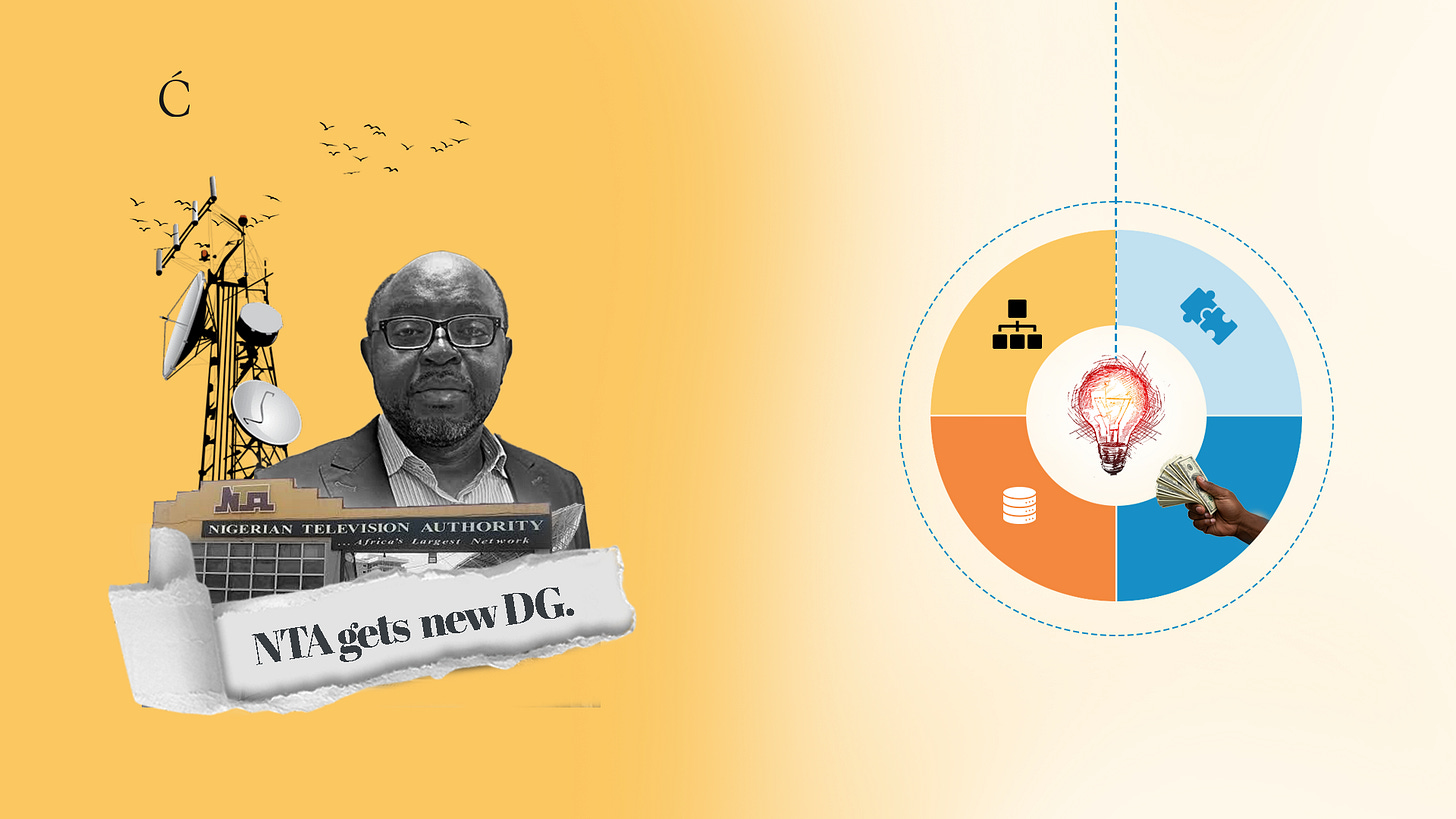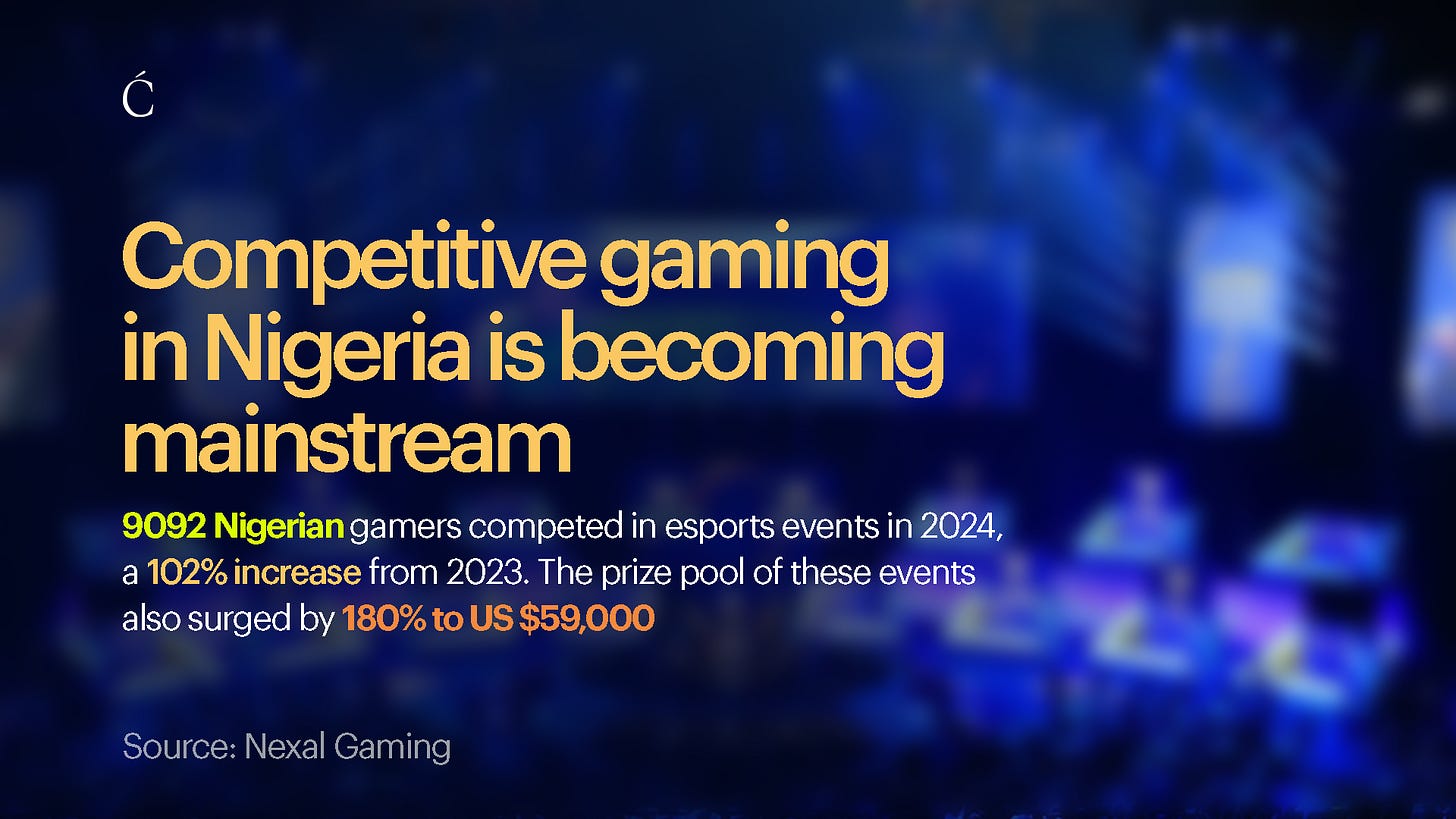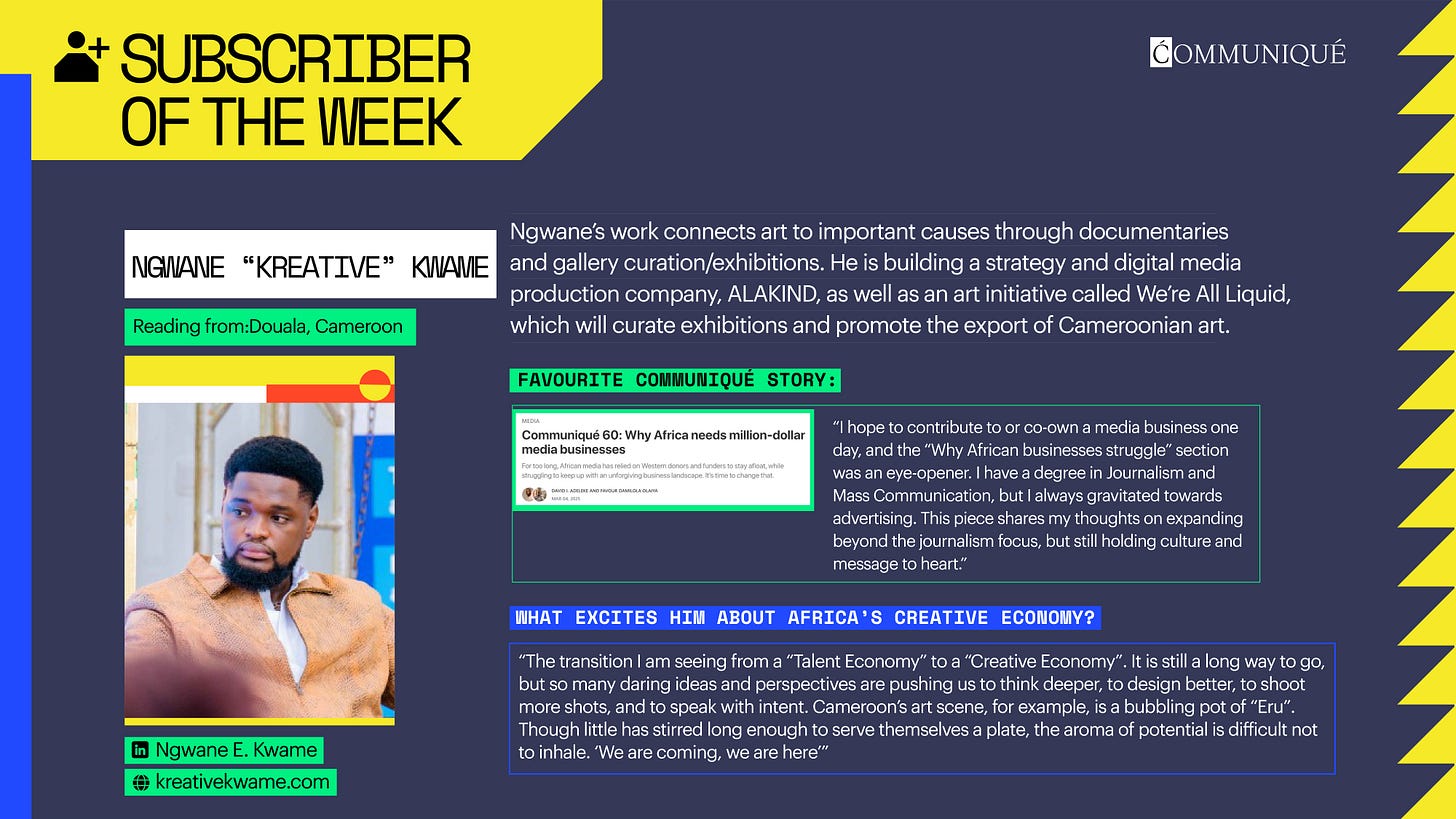Fresh faces at the helm of the Nigerian state broadcaster + DStv’s podcast bumps
NTA’s new management team and DStv’s bumpy foray into podcast
Hello there,
In today's digest, we discussed:
The quiet leadership reshuffle at Nigeria’s state broadcaster
The issues facing DStv’s foray into podcasts in South Africa
How Nigeria’s creative industries can reach their true potential.
Centre Spread 🗞️
NTA gets a new boss
The Nigerian Presidency has once again reshuffled the executive board of its state broadcaster, the Nigerian Television Authority (NTA).
On Thursday, 14 August, local media reported that four new executives had been appointed to the board. Media executive Rotimi Richard Pedro will be the new director general, replacing Salihu Abdulhamid Dembos. Other appointments included Karimah Bello as Executive Director of Marketing, Stella Din-Jacob as Executive Director of News, and Sophia Issa Mohammed as Managing Director of NTA Enterprises Limited.
This marks the second reshuffle in less than a year; the last was in September 2024, when seven members were appointed. These leadership changes aim to actualise the Federal Government’s goal of modernising the broadcaster and repositioning it in an increasingly competitive media market.
In Communiqué 74, we examined the broadcaster's attempt to reclaim its position as the “king” of television storytelling. A key argument noted was that “Legacy institutions can be revived with the right talent.” The latest hires seem to reinforce that observation.
Until three days ago, Din-Jacob was Director of News and Editor-in-Chief of the private TV station, TVC. Meanwhile, Richard Pedro brings nearly three decades of experience in broadcasting and sports rights management at various broadcasters in Africa, the UK, and the Middle East.
His career includes leadership roles at Bloomberg Television Africa and Rapid Blue Format, as well as consultancy work for FIFA, UEFA, Fremantle Media, and the African Union of Broadcasters (AUB), where he played a key role in securing exclusive pan-African free-to-air media rights for all CAF competitions. He is also the founder of Optima Sports Management International (OSMI), which he built into one of Africa’s top sports content providers, distributing premium events such as the English Premier League, UEFA Champions League, FIFA World Cup, and CAF competitions to audiences in more than 40 countries.
With these changes, the Nigerian government is banking on the experience and expertise of the new appointees in specific areas; news coverage, marketing strategy, content production, and commercial operations. The challenge, however, will be in translating leadership shifts into tangible results in programming, production standards, and audience engagement, especially in a rapidly evolving media landscape.
DStv’s podcast experiment hit early bumps
When MultiChoice South Africa’s DStv announced in March 2025 that it would air eight locally produced podcasts on its channels, the move was pitched as a way to inject fresh content into its entertainment slate.
Big-name shows such as Macgyver "MacG" Mukwevho’s Podcast and Chill were to be aired on its Mzansi Magic channel and serve as a bold merger of digital free-form conversation and traditional TV reach.
The decision made strategic sense: South Africa is home to one of the continent’s largest and fastest-growing podcast audiences, with a strong appetite for local voices and long-form, personality-driven content.
But five months later, the experiment is running into headwinds. Two of the eight shows have already been pulled: Podcast and Chill in May and Open Chats in August. Both shows were plagued by issues ranging from “ethical misconduct” to racially insensitive remarks and even personal feuds spilling into the public domain. While some offending content aired on YouTube rather than DStv, the platform has nonetheless borne the reputational fallout.
The incidents have also revived debate over whether podcasts in South Africa should be regulated, with some arguing that a framework is needed to prevent hate speech, defamation, and other harmful content from slipping through under the banner of “free expression.”
Meanwhile, DStv has tried to frame the changes as routine programming adjustments, pointing to “season endings” and the introduction of fresh content. However, when two high-profile cancellations happen within months, there may be deeper underlying issues.
Podcasts thrive on informality, spontaneity, and sometimes provocation. Linear television requires stricter editorial oversight and content safeguards, especially on a premium broadcaster like DStv. Attempting to merge the two creates a constant friction; the very unpredictability that makes podcasts compelling is what makes them a liability on broadcast TV.
The broadcaster has not said outright what it will do next, but it will be sure to maintain tighter rules to limit reputational damage, even if that blunts the raw appeal that drew it to podcasts in the first place.
Nigeria's creative industries need reliable data and collaboration to reach their true potential.
Nigeria’s creative industry is globally visible and a significant economic contributor. However, much of its potential outside of film and TV remains untapped. This was the focus at the inaugural QEDNG Creative Powerhouse Summit in Lagos on 12 August, where conversations centred on four pillars: data, capital deployment, infrastructure, and collaboration.
Dr. Nkiru Balonwu of African Soft Power Group stressed the need to build interconnected ecosystems rather than celebrate isolated successes. SO&U’s Group MD, Udeme Ufor highlighted the lack of reliable data to guide decisions and measure impact in the industry. Other speakers agreed that funding remains a challenge. All Africa Music Awards (AFRIMA) founder Mike Dada and The Temple Company’s Yemisi Falaye noted that helping banks and other financial institutions understand the sector and proving talent’s marketability could unlock traditional financing.
The summit’s conversations echo a position Communiqué has long advocated: building a thriving creative economy in Africa requires localised solutions, a commitment to infrastructural development, and stronger ecosystems. Next Thursday, August 21, we will take this conversation to East Africa. Communiqué IRL will gather creators, investors, and policymakers in Nairobi to explore how data and collaboration are essential to unlocking growth. Reserve your seats now, spaces are limited.
Crunch Time 📈
Competitive gaming in Nigeria is becoming mainstream
Catch Up 📬
From WhatsApp group to music powerhouse: The WeTalkSound story
WeTalkSound is one of the few fully integrated Nigerian music companies operating today. It can manage the journey of taking an artist from idea to the global stage. But it didn’t start out that way.
This week’s Communiqué essay chronicles its humble, if somewhat random, beginning as a WhatsApp group and how its founder, Dolapo Amusat, is working to build it into a media juggernaut in the mould of Jay-Z’s Roc Nation.
Here is an excerpt for you:
“Building a business began with Amusat deciding that being a part of conversations in the music industry wasn't enough; the community needed a media platform to shape conversations. “Media exists for different reasons, and one of them is to push agendas.” If WeTalkSound was going to be influential in Nigeria’s music ecosystem, it had to be able to create its own narratives. So, they built out an in-house publication and content team to create stories, interviews, and cultural commentary on the Nigerian music industry.”
Read the full essay here.
Communiqué’s Subscriber of the Week 🤩
Curiosity Cabinet 🗄️
Critically acclaimed Nigerian filmmaker Niyi Akinmolayan proposes a cheaper way to bring people to cinemas: offer ad-supported screenings.
Advertising and PR companies are leaning hard into the creator economy to futureproof themselves: “Across global markets, many agencies are recruiting content creators (often influencers, TikTokers and YouTubers) as full-time staff.”
So far, the career trajectory of the Managing Director of Co-Creation Hub (CcHUB), Ojoma Ochai, has been about preparing for the future and being lucky enough to act when it is right.
Explore Africa’s creative economy in one place. Communiqué’s African Creative Economy Database tracks 1,000+ companies, events, investors, and government actors across the continent.
That’s it for this week’s Digest. See you next week.





